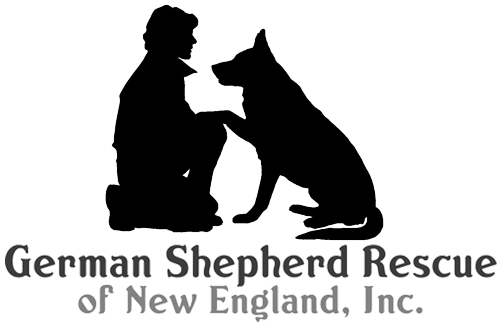FREQUENTLY ASKED QUESTIONS
ADOPTION | HEALTH & BEHAVIOR | MISC
If you can’t find an answer to your question(s), feel free to go to our Contact Page!
Adoption
Should I adopt a German Shepherd?
Before adopting a dog, especially a German Shepherd, think about you and your family's lifestyle. Think about the following questions:
- Are your hours at home irregular due to work or your social life?
- Do you mind having to always go home after work to let the dogs out or staying home a lot on weekends to care for and be with your dog?
- Do you plan on traveling a lot in the near future?
- Is your time already precious to you because you have children to concentrate on and must constantly bring them to their obligations (i.e. practices, lessons, games, etc) already?
- Is everybody in your household excited about adopting a German Shepherd or would some rather have another breed?
- Are some members of your household afraid of large dogs?
- Are you considering getting a German Shepherd as a “watch dog” because you are frequently away on business trips?
- Are you sure other members of your household can handle a GSD by theirselves?
If you've answered YES to any of these questions, we highly recommend reconsidering a German Shepherd until your circumstances change. You'll be glad you did and so will any dog you adopt.
If you've answered NO to all of these questions, feel free to visit our Adopt pages to learn more about our Adoption Process! We would love to chat with you about adopting one of our rescue dogs!
Why should I consider adopting a Rescue German Shepherd?
Because you'll save a life...
Each year, it's estimated that more than one million adoptable dogs and cats are euthanized in the USA, simply because too many pets come into shelters and too few people consider adoption when looking for a pet. The number of euthanized dogs could be reduced dramatically if more people adopted pets rather than buy them. When you adopt, you save a loving animal by making them part of your family and open up shelter space for another animal who might desperately need it.
Because you'll get a great animal...
Plenty of veterinarians, trainers, and articles online in the dog world right now recommend that a shelter or rescue dog is a great choice for ownership. Rescue dogs come from many places — given up by owners for a various reasons, strays, and/or rescued from shelter situations. Most rescue dogs are just happy, healthy dogs who wound up in a shelter or a rescue due to unforseen circumstances, not because they did anything wrong. Many are already house-trained and used to live with families.
Because it'll cost you less...
GSRNE medically treats any dog that comes into our program for any known problems, as well as updating the dog on vaccines, testing for parasites & heartworm, and putting the dog on heartworm preventatives. The dog's basic temperament must meet GSRNE's guidelines before that dog is accepted into the program. Generally, most rescue dogs have a known history and GSRNE will try to evaluate each dog over some time to try to determine whether the dog appears to be good with childen, other dogs, cats, etc. During this time, we also try to understand the dog's personality and their needs for a successful placement in the right kind of home. We also try to brush up on the dog's household manners, such as housebreaking, as well. All of this is covered by the adoption donation!
Because it's one way to fight puppy mills...
If you buy a dog from a pet store, online seller, or flea market, you're almost certainly getting a dog from a puppy mill. Puppy mills are factory-style breeding facilities that put profit above the welfare of dogs. Dogs from puppy mills are housed in shockingly poor conditions with improper medical care and are often very sick and can be behaviorally troubled as a result. The moms of these puppies are kept in cages to be bred over and over for years, without human companionship and with little hope of ever joining a family. After the dog moms are no longer profitable, they're discarded – either by killing, abandoning, or sold at an auction. These puppy mills continue to stay in business because of their deceptive tatics – their customers are unsuspecting consumers who shop in pet stores, over the internet, or through classified ads. Puppy mills will continue to operate until people stop supporting them. By adopting a rescue dog, you can be certain you aren't giving a dime to them.
Because you'll change this dog's whole world and get a new best friend out of the deal. What could be better than that?
Should I adopt a Puppy or Adult Dog?
Puppies are adorable fluffy, cute bundles of love, there is no question. They are quite hard to resist when you look at them. They are also extremely time-consuming and can be a lot of work, which most people just don’t expect. Puppies chew items (usually your favorite things), have accidents in the house, and need constant supervision. They are just babies, after all! People often expect puppies to behave as if they were adult, educated dogs. This leads to frustration and disaster.
If you want a puppy, be sure you have the time and patience...
- to deal with housebreaking
- crying at night
- chewed furniture and other damage a puppy
- plan on having no real time for much of anything else you enjoy doing for months
You also never know how a puppy will look when it grows up or its general personality until that dog reaches around 18-24 months old. And don’t forget the puppy energy level – that often doesn’t level off until the dog is between 2-3 years old!
Adult Dogs give you the chance to see the dog’s general personality. Most adult dogs are very adaptable and most will adjust well to your home. Adult dogs can and do bond to new owners quite readily. In fact, German Shepherds want to bond to an owner strongly and are very willing to do so to the first person who shows them love and care. You still need to provide structure, love, and training for an adult dog, as you would for any dog you raise, but the puppyhood chores are over for the most part with most rescue dogs.
If you are looking for a nice dog that knows...
- to generally not to chew things
- not to scream all night
- not to mess in the house
If you’re looking for a dog that...
- can start obedience training and fun games with right away
- can stay home all day without a major problem
- has an adult dog’s comprehension level and attention level
- who needs you as much as you want to want them
...then consider an Adult Dog!
GSRNE doesn't often get puppies into our program. The majority of our rescue dogs are 1 year old or older.
Health / Behavior
What is Bloat in dogs?
Gastric Dilatation-Volvulus (GDV), more commonly known as Bloat, is a serious, life-threatening condition in large breed dogs, especially in deep-chested dogs, such as German Shepherds.
Bloating of the stomach is often related to swallowed air (although food and fluid can also be present). It usually happens when there’s an abnormal accumulation of air, fluid, and/or foam in the stomach (“gastric dilatation”). Stress can be a contributing factor as well. Bloat can occur with or without “volvulus” (twisting). As the stomach swells, it may rotate 90° to 360°, twisting between its fixed attachments at the esophagus (food tube) and at the duodenum (the upper intestine). The twisting stomach traps air, food, and water in the stomach. The bloated stomach obstructs veins in the abdomen, leading to low blood pressure, shock, and damage to internal organs. The combined effect can quickly kill a dog.
Symptoms:
Typical symptoms often include some (but not necessarily all) of the following. Unfortunately, from the onset of the first symptoms you have very little time (sometimes minutes, sometimes hours) to get immediate medical attention for your dog. Know your dog and know when they're not acting right.
- Attempts to vomit (usually unsuccessful) / unproductive gagging
May occur every 5-20 minutes
This seems to be one of the most common symptoms & has been referred to as the “hallmark symptom” - Doesn't act like usual self
Perhaps the earliest warning sign & may be the only sign that almost always occurs. - Significant anxiety and restlessness
One of the earliest warning signs and seems fairly typical. - ”Hunched Up” or “Roached Up” appearance
This seems to occur fairly frequently. - Bloated abdomen that may feel tight (like a drum)
Despite the term “bloat,” many times this symptom never occurs or is not apparent. - Pale or off-color gums
Dark red in early stages, white or blue in later stages. - Lack of normal gurgling and digestive sounds in the tummy
Many dog owners report this after putting their ear to their dog’s tummy. - Coughing
- Heavy salivating or drooling
- Foamy mucus around the lips or vomiting foamy mucus
- Unproductive attempts to defecate
- Licking the air
- Seeking a hiding place
- Looking at their side or other evidence of abdominal pain or discomfort
- May refuse to lie down or even sit down
- May attempt to eat small stones and twigs
- Drinking excessively
- Heavy or rapid panting
- Shallow breathing
- Cold mouth membranes
- Apparent weakness; unable to stand or has a spread-legged stance. Especially in advanced stage.
- Accelerated heartbeat. Heart rate increases as bloating progresses.
- Weak pulse
- Collapse
Prevention:
Because no one understands the cause of bloat, there's, unfortunately, no real way to prevent it. However, there's some indications that may help:
- Simethicone (store brand-Phazyme) should be kept in your cabinet at all times. It is an anti-gas pill that can help to buy your vet some time should you think your dog is bloating. It may even stop the bloat if in the beginning stages. If you wait too long, the dog will not be able to swallow the pill. Make sure you tell your vet you have given the pills.
- Don’t exercise your dog heavily 1 hour before or 1-2 hours after eating
- Avoid single large meals. Instead, feed 2-3 small meals a day
- Don’t let your dog drink large quantities of water at one time
Additional Information:
What's Poisonous to Dogs? What do I do if my Dog ate something poisonous?
If your dog ate something poisonous, call your vet or a Pet Poison Control Hotline, such as:
- Pet Poison Helpline
- 1-855-764-7661
- $75.00 per incident **
- https://www.petpoisonhelpline.com/
- Pet Poison Helpline is a 24-hour animal poison control service available throughout the U.S., Canada, and the Caribbean for pet owners and veterinary professionals who require assistance with treating a potentially poisoned pet.
- ASPCA Animal Poison Control (APCC)
- 1-888-426-4435
- $75.00 per incident **
- https://www.aspca.org/pet-care/animal-poison-control
- The ASPCA Animal Poison Control Center (APCC) is your best resource for any animal poison-related emergency, 24 hours a day, 365 days a year.
** These prices are subject to change. Please check with the operator for current rates.
Here's a list of SOME, NOT ALL things that are poisonous to Dogs:
- Most Over-the-Counter Medication / Human Prescribed Medication
- Such as Acetaminophen (Tylenol), Ibuprofen, Naproxen (Advil, Aleve), Herbal & Nutraceutical Products, Anti-Depressants, Prescription Anti-Inflammatory & Pain Medications, Blood Pressure Medications, etc
- Chocolate / Coffee / Caffeine
- Includes Cocoa Mulch
- Chocolate Toxicity Meter
- Alcohol
- Avocado
- Rhubarb
- Alliums
- Such as Onion, Garlic, Leek, Chives, Scallions, etc
- Grapes / Raisins / Currants
- Some Nuts
- Such as Macadamia Nuts, Black Walnuts, etc
- Nutmeg
- Artificial Sweeteners
- Such as Xylitol - most commonly found in Sugar-Free Gum & Candy
- Yeast (i.e. Unbaked Bread Dough)
- Most Citrus
- Such as Lemon, Lime, Citrus Oil, etc
- Coconut / Coconut Oil
- Unripe Tomatoes
- Potatoes
- Dairy
- Some Plants / Flowers
- Such as Tulips / Hyacinth, Daffodils, Azalea, Lilies, Oleander, Dieffenbachia, etc
- Cat Food
- Though not immediate, over time / long term, it can cause health complications
- Wild Mushrooms (found in your yard / in nature)
Additional Resources:
Misc.
What do I do if I Lost my Pet or Found a Pet?
If you've lost your pet, don't delay in reporting your pet missing! The longer you delay, the farther from home your pet may be. The following tips may help you find your pet and/or let others know you've found their pet:
- Post about your Lost Pet or about a Pet you Found in your State's Lost Pets Facebook Page/Group:
- Post about your Lost Pet or about a Pet you Found on one of those websites:
- Create a Lost Pet Flyer / Found Pet Flyer
- Include the following on your flyer to maximize efficiency:
- "LOST [PET TYPE]" / "FOUND [PET TYPE]" bold & large at the top center
- Ex. "LOST DOG" / "FOUND DOG"
- Picture(s) of your pet - make sure the pictures are clear & detailed
- If Lost Pet, "DO NOT CHASE"
- Any helpful details such as Pet's Name, Sex, Weight, Breed, Colors, any attire they might be wearing (i.e. collar / harness / leash / etc)
- Dates & Locations - where/when you last saw your Pet
- Contact Information - i.e. Phone Number(s) with a "CALL ASAP" next to the Phone Number
- "LOST [PET TYPE]" / "FOUND [PET TYPE]" bold & large at the top center
- Hand them out to Pet Stores, Gas Stations, Animal Shelters/Rescues, and/or Animal Clinics in your surrounding area
- Hand them out to Animal Control Units and Police Departments of your town & surrounding towns
- Include the following on your flyer to maximize efficiency:
- Call surrounding towns' Animal Control Units, Animal Shelters/Rescues, and/or Animal Clinics
- If it's after hours, leave them a message
- Leave food & water outside the door you normally use to take your dog in/out for walks along with something with your scent,such as a blanket, crate, toy, etc
- Try to keep items dry
Additional Resources:
I need to Report Animal Abuse! What do I do?
Animal abuse, or animal cruelty is the crime of inflicting physical pain, suffering or death on an animal, usually a tame one, beyond necessity for normal discipline. It can include neglect that is so monstrous (withholding food and water) that the animal has suffered, died or been put in imminent danger of death.
Animal abuse can be a precursor to abuse and violence towards humans and/or a component of domestic violence. Like shared children, family pets are often used by abusers as a way to demonstrate power and control over their partner by threatening, harming, or sadly even killing beloved pets.
Animal Cruelty can be one, some, or all, but not limited to, the following:
- Failing to provide an animal with:
- Proper food & water
- Shelter or protection from the weather
- Veterinary attention needed to reduce or end suffering from disease or injury
- A sanitary environment
- Willfully abandoning your animal
- Carrying or causing an animal to be carried in or on a vehicle in a manner that endangers the animal including transport of an improperly secured animal
- Willfully permitting an animal to be subjected to unnecessary torture, suffering, or cruelty
- Subjecting, causing, or procuring an animal:
- to be tortured or tormented
- to be cruelly killed, beaten, or mutilated
- Failing to notify the owner or police after striking a dog or cat with a motor vehicle
- Using animals as lure or bait in a cruel or inhuman manner
- Transporting an animal in the back of a motor vehicle unless animal is properly restrained
- Offering or giving away any live animal (including goldfish) as a prive in a game of skill or chance
- Attending an animal fight event; Establishing or promoting an exhibition of animal fighting; or owning, processing, keeping, training, or breeding any animal to fight
- Using live vertebrates for experiments or exhibitions in a manner that causes them pain or interferes with their normal health
Listed below are some resources to assist in reporting animal abuse in your area:
- https://www.humanesociety.org/resources/report-animal-cruelty
- https://www.aspca.org/investigations-rescue/report-animal-cruelty
- Connecticut
- New Hampshire
- NHSPCA - Call 603-772-2921 ext. 111 or fill out the form listed
- Maine
- Maine Department of Agriculture, Conservation & Forestry - Call 207-287-3846 of 877-269-9200 (Toll Free), Monday - Friday 8:00AM - 4:30PM or Email animal.welfare@maine.gov
- Massachusetts
- MSPCA - Call 617-522-6008 or 800-628-5808, Monday - Friday 9:00AM - 5:00PM
- Rhode Island
- RIVMA - Call 401-438-8150 ext. 4 or Email cruelty@rispca.com
- Vermont
- Vermont Humane Federation - Call the Vermont State Police Field Stations at 802-722-4600 or the Shelff's Department in the Country you live in (phone numbers provided on website)



